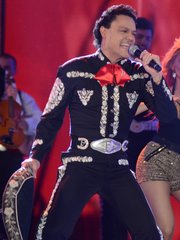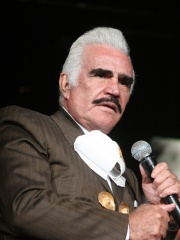



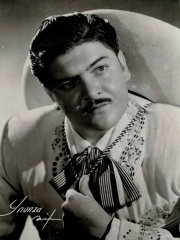

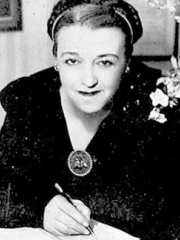

The Most Famous
SINGERS from Mexico
Top 10
The following people are considered by Pantheon to be the top 10 most legendary Mexican Singers of all time. This list of famous Mexican Singers is sorted by HPI (Historical Popularity Index), a metric that aggregates information on a biography's online popularity. Visit the rankings page to view the entire list of Mexican Singers.

1. Vicente Fernández (1940 - 2021)
With an HPI of 64.46, Vicente Fernández is the most famous Mexican Singer. His biography has been translated into 32 different languages on wikipedia.
Vicente Fernández Gómez (17 February 1940 – 12 December 2021) was a Mexican mariachi singer, actor and film producer. Nicknamed "Chente", "El Charro de Huentitán" (The Charro from Huentitán), "El Ídolo de México" (The Idol of Mexico), and "El Rey de la Música Ranchera" (The King of Ranchera Music), Fernández started his career as a busker, and went on to become a cultural icon, having recorded more than 100 albums and contributing to more than 150 films. His repertoire consisted of rancheras and other Mexican classics such as waltzes. Fernández's work earned him four Grammy Awards, nine Latin Grammy Awards, fourteen Lo Nuestro Awards, and a star on the Hollywood Walk of Fame. He sold over 50 million copies worldwide, making him one of the best-selling regional Mexican artists of all time. In 2016, Fernández retired from performing live, although he continued to record and publish music. In 2023, Rolling Stone named Fernández the greatest Mexican singer of all time and the 95th greatest overall with their "200 Greatest Singers of All Time" list.

2. Lila Downs (b. 1968)
With an HPI of 64.41, Lila Downs is the 2nd most famous Mexican Singer. Her biography has been translated into 110 different languages.
Ana Lila Downs Sánchez (born 9 September 1968) is a Mexican singer-songwriter. She performs her own compositions and the works of others in multiple genres, as well as tapping into Mexican traditional and popular music. She also incorporates indigenous Mexican influences and has recorded songs in many indigenous languages such as Mixtec, Zapotec, Mayan, Nahuatl and Purépecha. Born and raised in Oaxaca, she primarily studied at the Institute of Arts by Oaxaca and briefly attended the University of Minnesota, before withdrawing to focus on her musical career. She soon began performing in the traditional music scene of Oaxaca City. Her first (independent) album, Ofrenda, was released in 1994. In 1999, Downs came to prominence with her debut studio album, La sandunga, which was a critical and commercial success. She achieved international success in 2001 with the album Border which emerged in the music scene of Mexico and Latin America in the early 2000s (decade). Downs's seventh album, Pecados y milagros (2011), topped album charts in most major markets and generated chart-topping world music albums. Her eighth album, "Balas y Chocolate", was released in 2015. "Salón Lágrimas y Deseo", her ninth album, came out in 2017. Downs began performing in school, demonstrating her vocal ability with traditional music, Latin and American influences, and with her own original twist on dancing. Downs, a native Spanish speaker, also speaks fluent Mixtec and English. Downs through her activism has gone through great lengths to preserve the Mixtec language as well as many other Indigenous Mexican languages. Influenced by Chavela Vargas, Mercedes Sosa, Lucha Villa, and Amparo Ochoa, Lila Downs is recognized for her flamboyant, diverse and outré contributions to the music industry through her traditional and authentic fashion, the majority of which are based around Mexico's indigenous peoples' styles, cultures and heritages, which show through her performances and music videos. Her achievements include one Grammy Award and three Latin Grammy Awards. Besides her musical career, she involves herself with humanitarian causes and political activism, especially dealing with issues of Latin America's indigenous population.

3. Thalía (b. 1971)
With an HPI of 63.52, Thalía is the 3rd most famous Mexican Singer. Her biography has been translated into 63 different languages.
Ariadna Thalía Sodi Miranda (Spanish pronunciation: [aˈɾjaðna taˈli.a ˈsoði miˈɾanda]; born 26 August 1971), known mononymously as Thalía, is a Mexican singer, songwriter and actress. Referred to as the "Queen of Latin Pop", she is considered one of the most successful and influential Mexican artists. Having sold around 25 million records worldwide, she is one of the best-selling Latin music artists of all time. Aside from her native Spanish, Thalía has also sung in English, French, Portuguese and Tagalog. Her accolades include five Billboard Latin Music Awards, eight Lo Nuestro Awards, seven Latin Grammy Award nominations, and the Latin Recording Academy's President's Merit Award in 2019. She has collaborated with multiple artists, such as Tony Bennett, Michael Bublé, Robbie Williams, Marc Anthony, Laura Pausini, Romeo Santos, Maluma, Fat Joe, and Carlos Vives. As an actress, Thalía starred in a variety of successful telenovelas that aired in over 180 countries with an estimated audience of 2 billion people according to UNICEF, which led to her being called the "Queen of Telenovelas". The global impact of her telenovelas helped her popularize her music in non-Spanish speaking territories and markets in Europe and Asia. The Mexican media company Televisa called her the best-paid telenovela actress in history, while Billboard said she is the most widely recognized Spanish-speaking soap star in the world. Considered a Latin pop icon, Thalía was included among Billboard's Greatest Latin Artists of All Time in 2020 and People En Español's 100 most iconic Hispanic entertainers of all time in 2008. On 5 December 2013, she was honored with a star on the Hollywood Walk of Fame in recognition of her achievements in the music industry. As a businesswoman, Thalía enjoyed success with a fashion brand (having signed a deal with Macy's), as well she had her own nationally syndicated radio show and is the author of four books, including her memoir. During her career, Thalía has been involved in humanitarian causes and is a UNICEF Mexico Ambassador since 2016.

4. Juan Gabriel (1950 - 2016)
With an HPI of 62.55, Juan Gabriel is the 4th most famous Mexican Singer. His biography has been translated into 31 different languages.
Alberto Aguilera Valadez (Spanish pronunciation: [alˈβeɾto aɣiˈleɾa βalaˈðes]; 7 January 1950 – 28 August 2016), known professionally as Juan Gabriel (pronounced [ˈxwaŋ ɡaˈβɾjel] ), was a Mexican singer-songwriter. Colloquially nicknamed Juanga (pronounced [ˈxwaŋɡa]) and El Divo de Juárez, Juan Gabriel was known for his flamboyant style, which broke norms and standards within the Latin music industry. Widely regarded as one of the best and most prolific Mexican composers and singers of all time, he is considered a pop icon. Juan Gabriel is one of the best-selling Latin music artists in history and the top-selling Mexican artist of all time, with over 100 million records sold worldwide. His nineteenth studio album, Recuerdos, Vol. II, is reportedly the best-selling album of all time in Mexico, with over eight million copies sold. During his career, Juan Gabriel wrote around 1,800 songs. Some of his most popular, signature songs include titles such as "Amor eterno", "Querida", "Yo no nací para amar", "Hasta que te conocí", "El Noa Noa", "No tengo dinero", "Abrázame muy fuerte", "Te lo pido por favor", "Costumbres", "En esta primavera", "Pero qué necesidad", "La Farsante", "Debo Hacerlo", "Te sigo amando", "Yo No Sé Qué Me Pasó", "Siempre en mi mente", "De mí enamórate" and "Lo pasado, pasado"; amongst perhaps his most acclaimed songs are "Se me olvidó otra vez" and the heartbreaking ballad "Así Fue", popularized by and sung with Isabel Pantoja of Spain. Many of his compositions have been performed by and with other artists. In 2023, he ranked number 172 on Rolling Stone's list of the 200 Greatest Singers of All Time. The following year, the Library of Congress selected his recording of "Amor eterno" for preservation in the United States National Recording Registry.
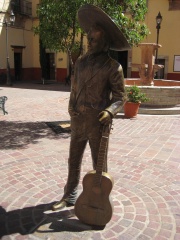
5. Jorge Negrete (1910 - 1953)
With an HPI of 61.02, Jorge Negrete is the 5th most famous Mexican Singer. His biography has been translated into 24 different languages.
Jorge Alberto Negrete Moreno (Spanish pronunciation: [ˈxoɾxe neˈɣɾete]; 30 November 1911 – 5 December 1953) was a Mexican singer and actor. He specialized in the musical genre of ranchera. His posthumous album "Fiesta Mexicana Volumen II" has been ranked by critics at No. 163 on their list of the greatest Latin albums of all time.

6. José Alfredo Jiménez (1926 - 1973)
With an HPI of 57.86, José Alfredo Jiménez is the 6th most famous Mexican Singer. His biography has been translated into 16 different languages.
José Alfredo Jiménez Sandoval (Spanish pronunciation: [xoˈse alˈfɾeðo xiˈmenes]; 19 January 1926 – 23 November 1973) was a Mexican singer-songwriter, whose songs are regarded as the basis of modern Regional Mexican music and Rancheras.

7. Paulina Rubio (b. 1971)
With an HPI of 55.78, Paulina Rubio is the 7th most famous Mexican Singer. Her biography has been translated into 45 different languages.
Paulina Susana Rubio Dosamantes (Spanish pronunciation: [pawˈlina ˈruβjo]; born 17 June 1971) is a Mexican singer, songwriter and television personality. Referred to as "The Golden Girl", she first achieved recognition as a member of the successful pop group Timbiriche from 1982 through 1991. After leaving Timbiriche, she embarked on a solo career. Rubio has sold over 15 million records, making her one of the best-selling Latin music artists of all time. Rubio's first two studio albums, La Chica Dorada (1992) and 24 Kilates (1993), were commercial successes and made her EMI Latin's best-selling Mexican female artist. In the mid-1990s, she adopted a more dance and electronic style for her next two albums, El Tiempo Es Oro (1995) and Planeta Paulina (1996), and made her feature film debut with a starring role in Bésame en la Boca (1995). Following a series of concerts with Timbiriche and ending her contract with EMI Latin, Rubio's career was interrupted before the release of her fifth studio album—and her first with Universal Latino—the homonym Paulina (2000), which is critically referred to as one of her best albums to date. Paulina was an international success and Rubio became the best-selling Latin music artist of the Billboard Year-End in 2001. She returned to the top of the charts again with her sixth and seventh albums, the crossover Border Girl (2002), and the acclaimed Pau-Latina (2004), both of which received positive reviews. Rubio garnered critical praise, including nominations for the Grammy Award and Latin Grammy Award. Her next albums, Ananda (2006) and Gran City Pop (2009), were also critically and commercially successful. She followed it with Brava! (2011), which delved into EDM. Early in the 2010s, Rubio stood out for participating as a coach in the most important talent shows in America and Spain. In 2012, she served as a coach on the second season of La Voz... Mexico. In 2013; Rubio became a coach on La Voz Kids, and also became a judge on The X Factor USA. In 2019, during the promotion of her eleventh studio album, Deseo (2018), she returned on La Voz... España and La Voz Senior. Rubio has scored three number one albums on the Billboard Top Latin Albums. Five of Rubio's singles have reached number one on the US Billboard Hot Latin Songs: "Te Quise Tanto", "Dame Otro Tequila", "Ni Una Sola Palabra", "Causa Y Efecto", and "Me Gustas Tanto", making her the fifth best performing female artist on the chart. Other singles, "Mío", "Y Yo Sigo Aquí" and "Don't Say Goodbye", topped the charts in most Hispanic countries. Rubio has earned numerous awards and accolades, including seven Billboard Latin Music Awards; five Lo Nuestro Awards; three MTV Latinoamerica Awards; and two Telehit Awards, including the Trajectory Award; and a special accolade as "Mexican artist with the greatest international projection". Rubio is regarded as a pop icon and is credited Latin pop era-defining during the 2000s. As one of the most influential female Mexican artists, she was included twice in 2012 and 2013 among the "50 Most Powerful Women in Mexico" by Forbes Mexico. Additionally, she was included in their "Celebrity 100: Twitter's most-followed superstars" list in 2015. In 2008, Univision ranked her among the most powerful Latin celebrities in the United States and as one of the Greatest Latin Artists of All Time by Billboard in 2020. According to a 2021 ranking by YouGov, Rubio is the 26th most popular Latin music artist and the 17th most famous.

8. María Grever (1885 - 1951)
With an HPI of 55.56, María Grever is the 8th most famous Mexican Singer. Her biography has been translated into 16 different languages.
María Grever (14 September 1885 – 15 December 1951) was the first female Mexican composer to achieve international acclaim. She is best known for the song "What A Difference A Day Makes" (originally "Cuando vuelva a tu lado"), which was popularized by Dinah Washington and has been covered by numerous artists.

9. Alaska (b. 1963)
With an HPI of 53.00, Alaska is the 9th most famous Mexican Singer. Her biography has been translated into 20 different languages.
Olvido Gara Jova (born June 13, 1963), known professionally as Alaska, is a Spanish-Mexican singer, songwriter, actress, television host and DJ. She was born and raised in Mexico City, until the age of 10, when her family moved to Spain. In Spain, she was a guitarist in the group Kaka de Luxe, until 1979, when she became the vocalist and composer of Alaska y los Pegamoides, a group with which she reached her first number one thanks to "Bailando", acquiring great recognition at a national level and in some Spanish-speaking countries. From 1983, she was the vocalist and composer of Alaska y Dinarama; group with which she continued releasing albums that reached a wide popularity. Many of her songs have reached number one on the music charts in Spain and wide recognition in several Spanish-speaking countries; her biggest hits include songs such as "Perlas ensangrentadas", "Rey del Glam", "Cómo pudiste hacerme esto a mí", "Ni tú ni nadie", "A quién le importa", "La funcionaria asesina", "Mi novio es un zombi" and "Quiero ser santa". She has appeared in several films, television and radio programs. In the 1980s she was in La bola de cristal (1984-1988), a television program broadcast on Televisión Española, which reflected the socio-political change brought about by the Spanish transition, as well as the cultural and musical explosion known as the “movida madrileña”. As an actress, her most recognized role was in Pepi, Luci, Bom and Other Girls on the Heap (1980), a feature film written and directed by Pedro Almodóvar. Among her work in television stands out her participation as a juror in Lluvia de estrellas (2001), as a presenter in Alaska y Segura (2014-2015), the Benidorm Fest 2022 and starring in the reality show Alaska y Mario (2011-2018), with her husband. Since 1989 she has been a member of Fangoria, an electronic music group that she leads together with Nacho Canut, who has accompanied her since her musical beginnings. The group began as part of the underground movement, and gained popularity with the release of their second album, Una temporada en el infierno (1999). Their greatest hits include songs such as "No sé qué me das", "Eternamente inocente", "Retorciendo palabras", "Miro la vida pasar", "Entre mil dudas", "Criticar por criticar", "Absolutamente", "Dramas y comedias", "Geometría polisentimental" and "Espectacular". Influenced by several personalities, Alaska is recognized for her changing and transgressive aesthetic sense with respect to music, fashion, live performances and music videos.

10. Anahí (b. 1983)
With an HPI of 52.06, Anahí is the 10th most famous Mexican Singer. Her biography has been translated into 41 different languages.
Anahí Giovanna Puente Portilla (born 14 May 1983), known mononymously as Anahí, is a Mexican singer, songwriter and actress. In 1986, she started her acting career when she was cast on Chiquilladas. After working on many successful telenovelas produced by Televisa, including Alondra (1995), Vivo por Elena (1998), El Diario de Daniela (1998) and Mujeres Engañadas (1999), her first leading role was in Pedro Damián's production, Primer Amor... A Mil por Hora (2000). In 2003, she joined the cast of Clase 406. Anahí reached international success in 2004 after starring in Rebelde and being part of the twice-Latin Grammy Award-nominated group RBD, which has sold over 15 million records worldwide. In 2011, she starred in Dos Hogares, her last telenovela to date. In 1993, at the age of 10, Anahí released her debut self-titled studio album. In 1996, she released her second album, ¿Hoy Es Mañana?, which featured the singles "Corazón de Bombón", "Por Volverte a Ver" and "Descontrolándote". She went on to record two additional albums titled Anclado en Mi Corazón (1997) and Baby Blue (2000). In 2009, Anahí released her fifth album, Mi Delirio, which sold 500,000 copies worldwide. The album debuted at number two on Billboard's Latin Pop Albums chart and number four on Billboard's Top Latin Albums chart, and was certified Gold in Brazil. Mi Delirio World Tour was her first worldwide tour. According to Billboard, Mi Delirio World Tour was the seventh most profitable tour of 2010. Anahí's sixth studio album, Inesperado (2016), was preceded by the singles "Rumba", "Eres" and "Amnesia". "Rumba", a collaboration with reggaeton singer Wisin, peaked at number one on Billboard's Tropical Songs chart. The album debuted on Billboard's Latin Pop Albums and Top Latin Albums charts, while it was number one on Billboard Brazil, making Anahí the first Mexican artist to achieve that. She has sold over five million albums worldwide in her career as a solo artist, being the best-selling RBD member in the United States. Anahí sings in various languages apart from Spanish, including English, Portuguese and Italian.
People
Pantheon has 35 people classified as Mexican singers born between 1885 and 1999. Of these 35, 29 (82.86%) of them are still alive today. The most famous living Mexican singers include Lila Downs, Thalía, and Paulina Rubio. The most famous deceased Mexican singers include Vicente Fernández, Juan Gabriel, and Jorge Negrete. As of April 2024, 8 new Mexican singers have been added to Pantheon including Yuri, Pedro Fernández, and Pilar Montenegro.
Living Mexican Singers
Go to all RankingsLila Downs
1968 - Present
HPI: 64.41
Thalía
1971 - Present
HPI: 63.52
Paulina Rubio
1971 - Present
HPI: 55.78
Alaska
1963 - Present
HPI: 53.00
Anahí
1983 - Present
HPI: 52.06
Alejandro Fernández
1971 - Present
HPI: 51.90
Marco Antonio Solís
1959 - Present
HPI: 51.77
Dulce María
1985 - Present
HPI: 50.71
Fermín IV
1974 - Present
HPI: 50.62
Yuri
1964 - Present
HPI: 50.28
Cristian Castro
1974 - Present
HPI: 50.06
Pedro Fernández
1969 - Present
HPI: 48.13
Deceased Mexican Singers
Go to all RankingsVicente Fernández
1940 - 2021
HPI: 64.46
Juan Gabriel
1950 - 2016
HPI: 62.55
Jorge Negrete
1910 - 1953
HPI: 61.02
José Alfredo Jiménez
1926 - 1973
HPI: 57.86
María Grever
1885 - 1951
HPI: 55.56
Valentín Elizalde
1979 - 2006
HPI: 49.32
Newly Added Mexican Singers (2025)
Go to all RankingsYuri
1964 - Present
HPI: 50.28
Pedro Fernández
1969 - Present
HPI: 48.13
Pilar Montenegro
1972 - Present
HPI: 44.77
Pablo Montero
1974 - Present
HPI: 43.91
Litzy
1982 - Present
HPI: 42.75
Babo
1976 - Present
HPI: 42.53
Marcela Bovio
1979 - Present
HPI: 42.52
Daniela Luján
1988 - Present
HPI: 39.94
Overlapping Lives
Which Singers were alive at the same time? This visualization shows the lifespans of the 6 most globally memorable Singers since 1700.







